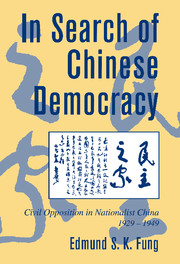Book contents
- Front Matter
- Contents
- Acknowledgments
- A Note on Romanization
- Abbreviations
- Introduction
- 1 The Dictatorial Regime
- 2 Setting the Opposition Agenda: The Issue of Human Rights, 1929–1931
- 3 The National Emergency, 1932–1936: Political and Intellectual Responses
- 4 In Defense of Democracy, 1933–1936
- 5 An Abortive Democratic Experiment: The People's Political Council, 1938–1945
- 6 Wartime Democratic Thought
- 7 The Third Force Movement: The Chinese Democratic League, 1941–1945
- 8 “Peace, Democracy, Unification, and Reconstruction,” 1946
- 9 The Last Stand of Chinese Liberalism
- Conclusion
- Selected Bibliography
- Glossary
- Index
4 - In Defense of Democracy, 1933–1936
Published online by Cambridge University Press: 22 September 2009
- Front Matter
- Contents
- Acknowledgments
- A Note on Romanization
- Abbreviations
- Introduction
- 1 The Dictatorial Regime
- 2 Setting the Opposition Agenda: The Issue of Human Rights, 1929–1931
- 3 The National Emergency, 1932–1936: Political and Intellectual Responses
- 4 In Defense of Democracy, 1933–1936
- 5 An Abortive Democratic Experiment: The People's Political Council, 1938–1945
- 6 Wartime Democratic Thought
- 7 The Third Force Movement: The Chinese Democratic League, 1941–1945
- 8 “Peace, Democracy, Unification, and Reconstruction,” 1946
- 9 The Last Stand of Chinese Liberalism
- Conclusion
- Selected Bibliography
- Glossary
- Index
Summary
The passion of enlightenment intellectuals in defending democracy was not diminished by the Japanese threat. “China was once again ready to listen to educated young men and women who sought to combine national salvation with a deeper commitment to intellectual emancipation,” writes Vera Schwarcz. “As in the May Fourth movement at Beida [Beijing University], a vocal minority arose to do battle with cultural conservatives, both those inside and outside the Guomindang.” Prodemocracy writers were a vocal minority who rose to do battle with the dictatorial regime in the intellectual marketplace of ideas, convinced that democracy was relevant to the national emergency, the foreign threat being no justification for dictatorship, new or old.
Writing on the democracy versus dictatorship debate of 1933–1934, Lloyd Eastman commented that the debate was “mundane, a trifle stodgy” and that democracy's defense was “faltering” and “poor.” “The advocates of democracy seldom articulated a comprehensive defense of their position and instead sniped at the shortcomings of the [GMD's] system of party rule.” Particularly unimpressed with Hu Shi's kindergarten politics argument, Eastman was adamant that Chinese democrats lacked “a sophisticated understanding of the true character of liberal democracy.” He overlooked the fact that the great debate went beyond 1934 and the pages of Duli pinglun to become a wider democracy discourse.
- Type
- Chapter
- Information
- In Search of Chinese DemocracyCivil Opposition in Nationalist China, 1929–1949, pp. 114 - 143Publisher: Cambridge University PressPrint publication year: 2000



